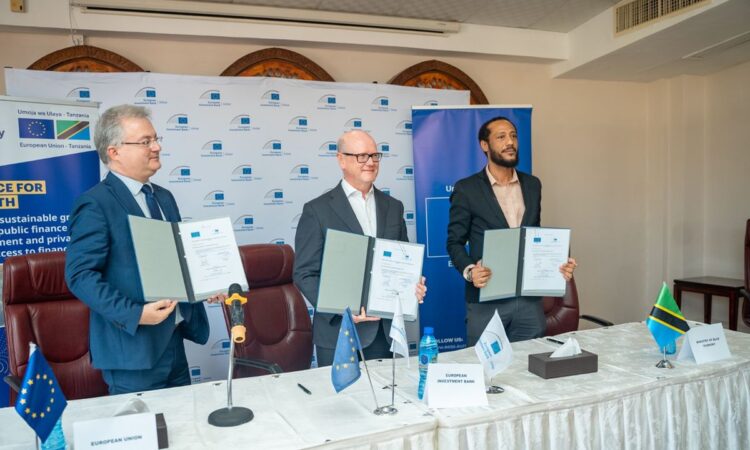
Dar es Salaam. The European Union (EU) has granted €15 million (Sh43 billion) to support Small and Medium-Sized Enterprises (SMEs) activities in Tanzania.
This funding will be blended with loans from the European Investment Bank (EIB) to provide credit to local banks, with the significant development aiming to enhance access to finance for SMEs, a critical sector in Tanzania’s economy.
The announcement was made after a five-day visit by EIB Vice-President Thomas Östros and Deputy Ambassador of the European Union to Tanzania Emilio Rossetti.
The two officials signed a statement of intent on July 5, 2024, marking a new phase in EU-Tanzania relations under the EU Global Gateway strategy.
“This grant will finance advisory services and technical assistance at the early stages of financing, preparing businesses for subsequent commercial investment,” said Mr Östros.
He emphasized that the funding will help de-risk lending by local banks, making it easier for SMEs to access much-needed capital.
The EIB has already committed €270 million out of the planned €350 million in loans to Tanzanian banks.
These funds have been distributed among CRDB Bank PLC (€150 million), NMB Bank PLC (€100 million), and KCB Tanzania (€20 million).
According to Mr Östros, “The financing support we signed last year has already reached over 10,000 final beneficiaries, including more than 3,000 women-led enterprises and over 900 blue economy enterprises and cooperatives in Zanzibar.”
The remaining €80 million will be allocated to other financial intermediaries in Tanzania, and discussions are ongoing with potential candidates, indicating strong interest and demand for this support.
A key focus of this initiative is on gender and the blue economy, sectors that often face significant financial constraints.
Mr Östros noted, “This package directly supports the Global Gateway and aligns perfectly with the priority sectors of the Tanzanian government, as well as the EU and EIB development goals.”
Tanzania’s economy has shown remarkable resilience and growth, supported by robust private sector development.
The government’s partnership with local, regional, and international partners has positioned the country as a key player in the EU Global Gateway development initiative.
“Small businesses are a key part of the African economy. They create jobs and drive economic development and innovation,” said Mr Östros.
“At the EIB, we use a variety of tools to address financing gaps at various stages of business creation, including the riskiest ones, to develop an efficient entrepreneurial ecosystem driven by entrepreneurs’ skills and expertise.”
The EU’s support is particularly significant for underserved groups, such as startups and women-led businesses.
Deputy Ambassador Rossetti stated, “We are working jointly with the EIB to enhance access to finance for SMEs and promote financial inclusion of underserved people, such as startups or youth and women-led businesses in Tanzania.”
During the EU-Tanzania Business Forum last year, EIB Global signed a €270 million (Sh775 billion) package to support local businesses through cooperation with commercial banks.
This was the largest investment support to any country in Sub-Saharan Africa in 2023.
Deputy Permanent Secretary in the Ministry of Blue Economy and Fisheries in Zanzibar, Zahor El Kharousy, welcomed the support, highlighting its benefits for both Mainland Tanzania and Zanzibar.
“We have five priority areas in the blue economy, and one of the key ones is support to women, who form 85 percent of the sector,” he said.








